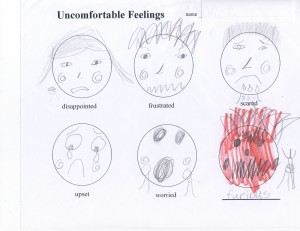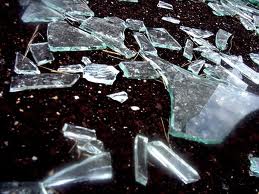|
|
September 9, 2014
This recent email has me vibrating with rage. I know. I know. I’m supposed to manage my destructive emotions. Take re-centering breaths and all that. But as a woman, a mom, and an educator, this one has me ready to strangle someone.
 I’m not going back there. Just read it and tell me what you think:
Hey Terra,
I just started freshman year and I have to take swim class. I have large breasts and the girls in the class make fun of me in the shower and in the pool. Today, while we were swimming, one girl went into my locker and stole my bra. I had to get dressed for my next class without a bra!! Do you have any idea how humiliated I felt walking around like that? Guys were staring at me and a few guys tried to touch my breasts! That’s what I had to go through for two whole periods until my mom came and brought me a bra. This is the first year of high school and I’m a joke already. All my friends are at another school so I’ve got no one who has my back. – Who Cares?
Before you read my answer, here’s my video response on Vidoyen:
How do we teach kids that cruel is not cool? posted by Annie Fox, M.Ed. on Vidoyen.
My Answer:
Dear Who Cares?
First, let me say that I care. A lot!
Second let me say… WOAH!!! What happened to you today is beyond awful. It is also totally unacceptable. For starters, shaming you about your body, having people stare at your breasts and try to touch you… all of this is sexual harassment and it’s against the law.
I understand how awful you feel, but please talk to your PE teacher ASAP! (That’s who runs the swimming class, right?) She or he (hopefully it’s a she) but either way, the PE teacher needs to know immediately what happened today. No way should any girl get away with going into your locker and stealing anything! But a girl stealing another girl’s bra… that’s so cruel I am actually seeing red. (That’s how angry I am right now.) And no boy should get away with trying to touch you without your permission! (Give me a break, guys. What idiot told you that’s ever OK?!)
I get that you might not want to talk about this, but you wrote to me for advice and I’m giving it to you. Talk to your mom right now. Get off the computer and talk to her. You think that “no one has your back.” Not true! Your mom has your back. She proved that today. She can help you. She wants to. If you were my daughter I would tell you this, “I am so sorry that this happened to you. My heart is breaking to hear about it. I know how humiliating this must have been! We need to work together, you and I, to make things better for you at school. Better for you with the girls in your gym class and better for you with those ignorant boys who bother you and made you feel even more uncomfortable when you walk down the hall. You need to let the school know what happened. If you feel you can call for this meeting on your own, then go for it. But if you need my support to call the school and set up a meeting with the PE teacher and the counselor and school administration, then I am here for you 1000%.”
Talk to your mom right now… before another day of school.
OK, sweetie?
In friendship,
Terra
If you or anyone you know, has had an experience involving sexual harassment or “body shaming” at school, I want to hear about it in the COMMENTS section. Thanks.

July 28, 2014
 Feeling uncomfortable? Now use it for good. As we approach the beginning of the new school year, my heart goes out to the kids who are dreading it. They are usually the ones who had to wade through more than their share of social garbage last term. Hopefully they got a needed reprieve during the summer. But they’ve got to go back and most of them (and their parents and teachers) are probably not looking forward to the inevitable crapola (online and off).
Being in the prevention business, I’m always working on ways to make schools more compassionate. Here’s my latest contribution… just a reminder… adapted from the Charter for Compassion’s call to action for cities.
A compassionate school is an uncomfortable school!
Uncomfortable when anyone is threatened, harassed, or made to feel less than.
Uncomfortable when every child isn’t treated with respect by every teacher and every other student.
Uncomfortable when every student isn’t given rich opportunities to grow intellectually, creatively, and emotionally.
Uncomfortable when, as a school community, we don’t treat each other as we want to be treated.
A compassionate school knows uncomfortable feelings aren’t worth zippo, if they don’t trigger action. So a compassionate school recognizes the discomfort and immediately works for change with the full leadership and commitment of all administrators and teachers. With adult leadership, students learn how they too can become change agents. Because, whether students admit it or not, they desperately want their school to be a place where every kid is treated with respect. Every one.
Got it? Good. Now go make your kid’s school really uncomfortable. We’re in this together.

April 29, 2014
There have always been kids who seem to get pleasure and a power-high from bugging other kids. Maybe there always will be. Thankfully, adults are getting wise to the fact that “Kids will be kids” is no excuse for peer-harassment. Over the past decade, we have learned some heart-breaking lessons about the tragic consequences of unstopped harassment. Our education has come through the irreparable damange caused to targeted kids and their families. These days, at least on paper, parents and educators are much less tolerant of “mean kid” behavior than we have been in the past.
Of course, we’re talking about bullying (online and off) but I’ve purposely not yet used the word because it’s overused to the point of being meaningless.
Let’s get one thing straight, the definition of bullying is not: Everything that other people do that you don’t like. A rude, one-time comment is not bullying. A friend telling you that she doesn’t want to be your friend any more is not bullying. When everything is called bullying, kids miss the point and nothing changes for the good. So let’s be clear. Peer harassment is a) ongoing b) unwanted and c) typically involves a power disparity between the two people. For example, boss to employee, coach to player, parent to child, older sibling to younger, “popular” kid to less popular kid.
In my most recent 3 minute Vidoyen video I answered the question: How can parents and educators do a better job reducing bullying?
 How to stop it? I’ve got answers

October 24, 2013
 Watch where you step. Watch what you toss. I know a school where broken glass is a serious problem. Kids there freely toss it in classrooms and hallways, in the lunchroom and on the playground. Where do they get it? It’s everywhere for the taking and every day there’s more. The students at this school keep their pockets full so whenever they feel the urge, they lob sharp fragments at other students. When the glass hits the mark it pierces and often sticks. The fallen shards are left for others to step on.
Does it hurt the hands of the kids who throw the glass? Sure, but it’s worth a little pain because in this school it’s cool to make other people suffer. Pumps up the glass throwers and makes them feel powerful. And if all of this weren’t appalling enough, in this school kids are required to walk around barefoot. You heard correctly. No protection allowed for those tender little soles. If you visited, you’d see kids limping around with bloody feet and hands.
Not a place you’d ever send your child, I’m sure.
So where is this school? Maybe you’re guessing it’s in that state. The place where parents have no common sense nor the time/inclination to teach their kids to be good people. If you guessed “Not my state,” you’d be wrong. Actually, this glass-filled school is in your state. In fact, it’s the school your child attends.
(Excuse me while I cover my ears to mute the screams of: “You’re wrong, Annie! My child’s school does not have broken glass anywhere! Every corner of our school is safe.”
OK, you got me. There’s no actual broken glass lying around any school I know. I just made up the glass thing as a not-so-subtle metaphor for the teasing, rumors, harassment, and general peer-to-peer meanness found in every school.
So… now that we know what we’re talking about and we’re willing to admit that yes, there is some broken glass in our school, what are we doing about it? How might teaching our kids my glass metaphor change their attitudes and behavior? Try it and let me know what happens. The way I figure it, it’s worth the effort to protect their tender souls.
 — Older Posts »
| |















